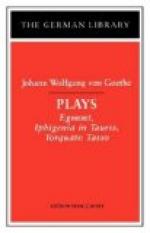Machiavel. I know it. The king commands and puts you in full possession of his intentions. You are to restore tranquillity and peace by measures which cannot fail still more to embitter men’s minds, and which must inevitably kindle the flames of war from one extremity of the country to the other. Consider well what you are doing. The principal merchants are infected—nobles, citizens, soldiers. What avails persisting in our opinion, when everything is changing around us? Oh, that some good genius would suggest to Philip that it better becomes a monarch to govern burghers of two different creeds, than to excite them to mutual destruction.
Regent. Never let me hear such words again. Full well I know that the policy of statesmen rarely maintains truth and fidelity; that it excludes from the heart candour, charity, toleration. In secular affairs, this is, alas! only too true; but shall we trifle with God as we do with each other? Shall we be indifferent to our established faith, for the sake of which so many have sacrificed their lives? Shall we abandon it to these far-fetched, uncertain, and self-contradicting heresies?
Machiavel. Think not the worse of me for what I have uttered.
Regent. I know you and your fidelity. I know too that a man may be both honest and sagacious, and yet miss the best and nearest way to the salvation of his soul. There are others, Machiavel, men whom I esteem, yet whom I needs must blame.
Machiavel. To whom do you refer?
Regent. I must confess that Egmont caused me to-day deep and heart-felt annoyance.
Machiavel. How so?
Regent. By his accustomed demeanour, his usual indifference and levity. I received the fatal tidings as I was leaving church, attended by him and several others. I did not restrain my anguish, I broke forth into lamentations, loud and deep, and turning to him, exclaimed, “See what is going on in your province! Do you suffer it, Count, you, in whom the king confided so implicitly?”
Machiavel. And what was his reply?
Regent. As if it were a mere trifle, an affair of no moment, he answered: “Were the Netherlanders but satisfied as to their constitution! The rest would soon follow.”
Machiavel. There was, perhaps, more truth than discretion or piety in his words. How can we hope to acquire and to maintain the confidence of the Netherlander, when he sees that we are more interested in appropriating his possessions, than in promoting his welfare, temporal or spiritual? Does the number of souls saved by the new bishops exceed that of the fat benefices they have swallowed? And are they not for the most part foreigners? As yet, the office of stadtholder has been held by Netherlanders; but do not the Spaniards betray their great and irresistible desire to possess themselves of these places? Will not people prefer being governed by their own countrymen, and according to their ancient customs, rather than by foreigners, who, from their first entrance into the land, endeavour to enrich themselves at the general expense, who measure everything by a foreign standard, and who exercise their authority without cordiality or sympathy?




